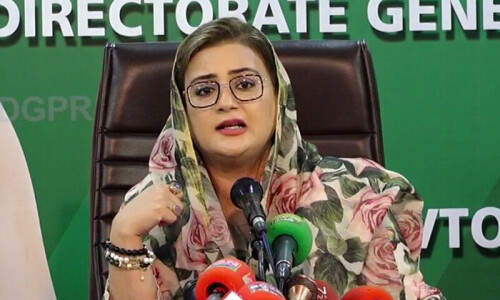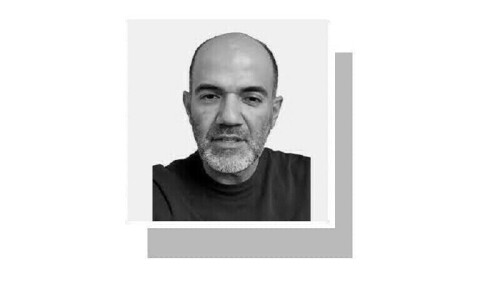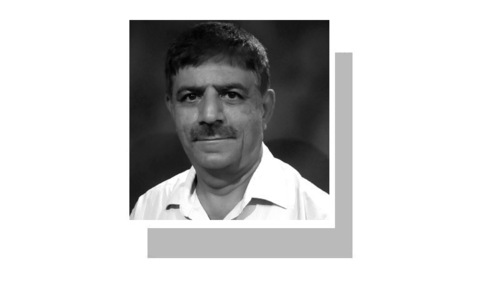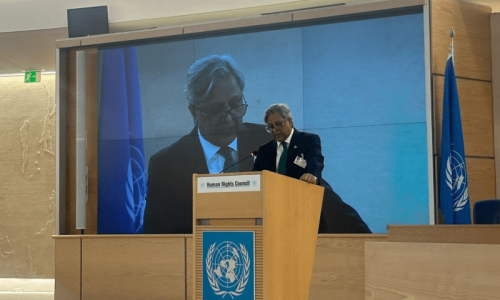KARACHI: An interchange at the Pakistan Institute of International Affairs (PIIA) between Prof Dr Conrad Schetter and Dr Masuma Hasan, chairperson of the PIIA, revolved around Pakistan’s role in the international community, its interconnectedness as well as its increasing isolation from global politics.
An associated member of the Centre for Development Research (ZEF) of the University of Bonn, Dr Schetter’s topic of discourse was titled ‘A German perspective on Pakistan and its big neighbours’. He stressed the need for the narrative in the region to shift from geopolitics to geo-economics.
“Power depends on economics and not on military forces or approaches,” he said. Dr Schetter tried to explain how despite the economic development within Pakistan via the CPEC being considered positively, in reality many of Pakistan’s neighbours were several steps ahead with economic engagements on more fronts and with several countries simultaneously.
These projects include the Chabahar Port, as well as several other Eurasian projects where a new economic corridor was being built up. Thus, he said, it was imperative that Pakistan engaged economically with other countries, in specific its immediate neighbours.
India, he said, was in a much better position economically and had tapped into this advantage internationally, while Pakistan had over the years lost trust in several quarters, and one such was in Central Asia.
Dr Schetter is also director for research at the Bonn International Center for Conversion (BICC), and will be the first member to represent peace and conflict research in the Board. He has written extensively as well as worked in the field in countries such as Afghanistan, India, Iran, Pakistan, and in certain Central Asian states such as Kyrgyzstan and Tajikistan. He shared several anecdotes with regards to his travels which highlighted an increasing isolation of Pakistan in a global context.
“A couple of years ago I was invited by a think tank in Tashkent, Uzbekistan. When we talked about Eurasian projects ... they shared their fears mostly about Afghanistan and its growing Islamism. But Pakistan was considered the real problem. There is a great loss of trust in respect to Pakistan while there is a great deal of trust in India,” he said.
Turning his attention to India, Dr Schetter said both countries needed to resolve their political issues which contributed to instability in the region. Trust building, increased economic trade, multi-track diplomacy was needed between the two, as was a departure from nationalist, territorial logic.
He several times, during his talk, also emphasised on the German government’s support towards helping Pakistan resolve its issues.
Innovation is essential, according to Dr Schetter, towards Pakistan becoming more connected with the world. One such way, he elaborated, was to set up a knowledge-based economy which the country lagged behind in.
The CPEC was also debated on and in his discourse, Dr Schetter’s word of caution concerning China’s engagement in Pakistan centred on whether China really considered Pakistan a friend or a mere economic partner.
However, some of Dr Schetter’s observations regarding Pakistan were counter argued by Dr Masuma Hasan. She specially negated Dr Schetter’s view about how the country needed more social change to economically evolve.
“I think there are very few countries in the world, under-developed or developed, in which there has been so much social change as in Pakistan. It is estimated that within the next few years, 50 per cent of Pakistan’s population is going to be urban, which is a big social change.”
She also spoke about how issues of feudalism and the biradari system in Pakistan are seen by western scholarship in a stereotypical way. “Why don’t you focus on how these systems have broken down? How so much change has come about in traditional power relations? Go into the field and you will see the change,” she summed up.
German consul general Rainer Schmiedchen was also present at the occasion and expressed his desire of more joint research projects between Pakistan and Germany.
Published in Dawn, December 14th, 2016














































